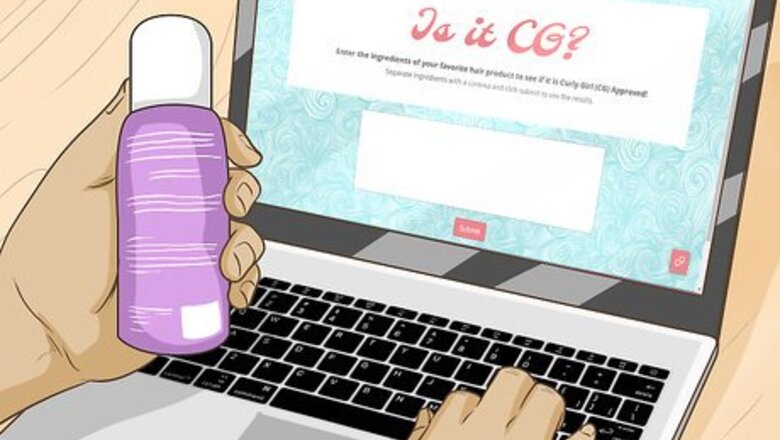
views
Checking a Curly Girl Ingredient Analyzer
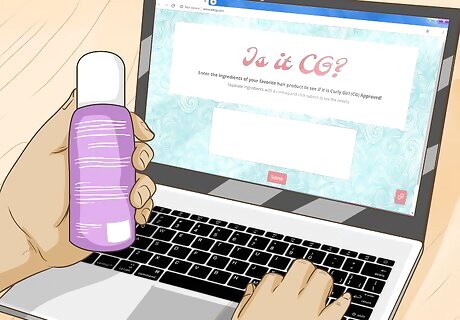
Navigate to a webpage that features a Curly Girl ingredient analyzer. Many websites have a place where you can enter the product's ingredients to determine if they're Curly Girl approved. For instance, visit one of the websites at http://www.isitcg.com/ or https://www.curlsbot.com/.Tip: If you want to make sure you're using Curly Girl-approved products, try DevaCurl No-Poo or As I Am Coconut CoWash Cleansing Conditioner. You can also use natural products, such as coconut oil or argan oil.
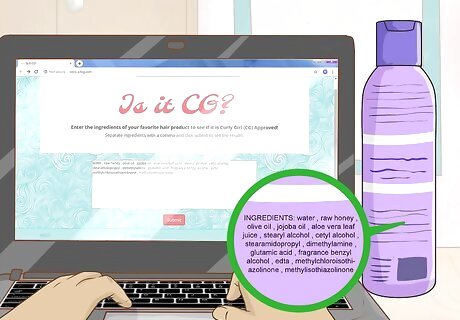
Type in the ingredients from the product. Look on the back of the product for the ingredient list. Add ingredients to the box on the website, making sure to separate each one with a comma or a comma and a space. Be sure to spell the ingredients correctly; if you misspell something, the website may sort it into the wrong category because it doesn't recognize it.
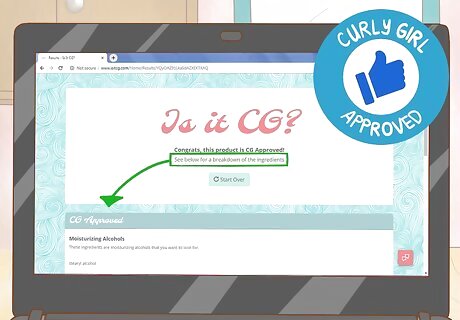
Hit "Submit" and look at the results. Once you hit "Submit," you'll be redirected to a second page with your results. The website http://www.isitcg.com/ divides ingredients into "Not CG Approved" and "Probably OK," for instance. If any of the ingredients fall into "Not CG Approved," then you want to avoid that product if you're using CG Approved ones. "Probably OK" means that the ingredients didn't directly match ones on the "bad" list or they're on the CG Approved list.
Avoiding Damaging Ingredients
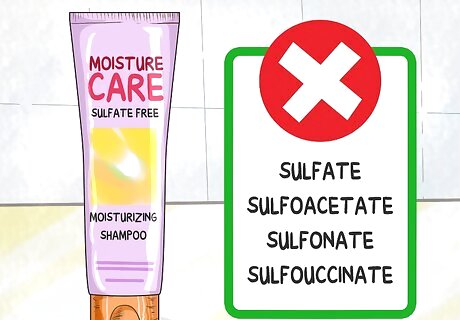
Skip products with sulfates in them. Surfactants dissolve in water and reduce the surface tension on your hair, which helps the product remove dirt from the area. That sounds good, but some surfactants, like sulfates, can also be damaging to your hair, as they strip it of its natural oils. When using the Curly Girl method, avoid products with these ingredients. Look for products that are labeled "sulfate-free" to help you choose the best option for your hair. In addition, read the ingredient list to look for sulfates. Even if a product is labeled "sulfate-free," it may still contain sulfate ingredients. That's because the manufacturer is typically referring to more damaging sulfates, such as sodium lauryl sulfate. Go over the ingredient list carefully to find sulfate ingredients before deciding if a product is Curly Girl approved. Common sulfates include alkylbenzene sulfonate, sodium cocoyl sarcosinate, ammonium or sodium xylenesulfonate, and dioctyl sodium sulfosuccinate. Look for words or endings like "sulfate," "sulfoacetate," "sulfonate," and "sulfouccinate."
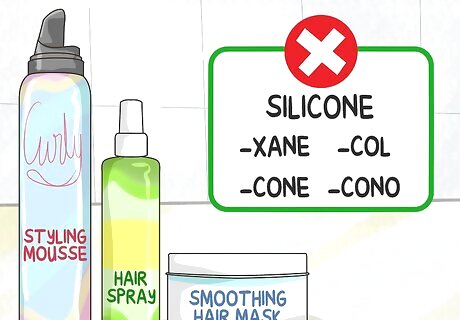
Avoid products with silicone ingredients that aren't water soluble. These products tend to build up on your hair over time because they coat your hair to give it shine. They keep moisture from getting into your hair, and to get them out, you need harsh products that contain sulfates. Therefore, it's best to avoid them. Read the ingredient list to find ones with endings like "-xane," "-cone," "-col," and "-conol" so that you can avoid products that contain them. Common ingredients that fall into this category include dimethiconol, cetyl dimethicone, dimethicone, cetearyl methicone, and stearyl dimethicone. Use the same rues when buying styling products. Stay away from silicone products. "After battling serious scalp infections (with a trip to the urgent care and two rounds of antibiotics) I found the culprit to be silicone products in my styling products. The list here has helped me in my search for something safe." - Kristen M. Too many washes can damage your hair. "Before I knew any of this information I used to wash my hair every day, and some days I even washed it twice with shampoo. Now I know what damages my hair, and what doesn't, my curls have never looked better!" - Annie S. My hair is finally shiny! "I have short hair that is curly, and I now use conditioner only twice a week, leaving it in for around five minutes and then rinsing it out. I no longer visit the hairdresser once a week, and my hair is shiny and looks good." - Denise R. Have a story our readers should hear? Share it with 1 billion+ annual wikiHow users. Tell us your story here.
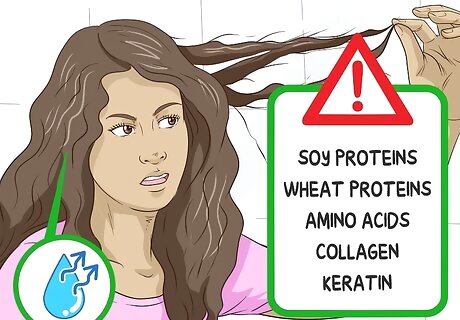
Don't use products with proteins if you're still having hair problems. Sometimes, proteins can make your hair dry and brittle. You're more susceptible to this issue if your hair is coarse, so if you're having this problem, check the ingredient list for proteins. Look for things like soy proteins, wheat proteins, amino acids, collagen, and keratin.
Knowing What Ingredients to Look for
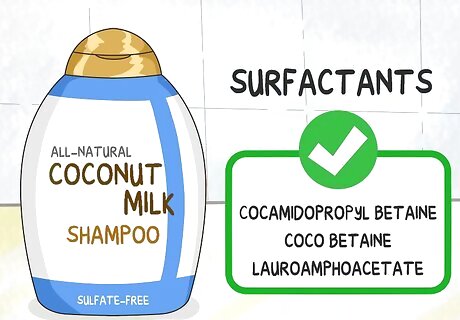
Opt for better surfactants in place of sulfates. You still need surfactants sometimes, but you have better options available to you than sulfates. These include ingredients like coco betaine and lauroamphoacetate, just to name a few. Other options include sodium cocoyl isethionate, cocamidopropyl betaine, disodium cocoamphodiacetate or cocoamphodipropionate or cocamphodipropionate, or ocoamphoacetate.

Choose products with water-soluble silicones. These silicones are okay to use on curly hair, as they won't build up over time; you can use water to wash them out. Pick ones like hydrolyzed wheat protein hydroxypropyl polysiloxane, dimethicone copolyol, or lauryl methicone copolyol. Also look for silicone names that have "PPG" or "PEG" in front of them. That indicates they're water-soluble. Silicones are used to help detangle your hair, as well as to add shine.
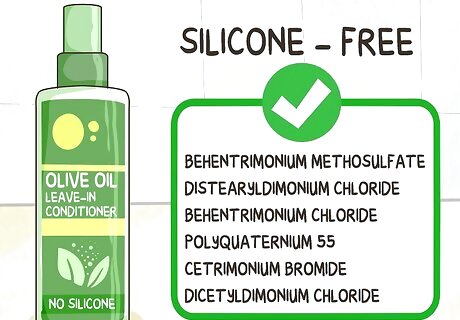
Look for other ingredients that replace silicones. If you want to avoid silicones altogether, other ingredients can help with lubrication, too. These ingredients aren't silicone-based. Certain types of chlorides can help, for instance. Try behentrimonium methosulfate, distearyldimonium chloride, behentrimonium chloride, polyquaternium 55, cetrimonium bromide, or dicetyldimonium chloride.
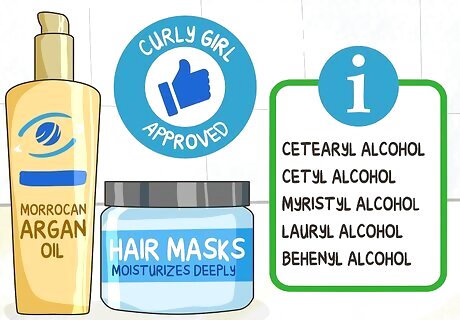
Opt for hydrating alcohols over drying ones. Most alcohols are drying, so if you see them on the ingredient list, you may want to avoid that product. Exceptions to this rule are hydrating alcohols, which include cetearyl alcohol, cetyl alcohol, myristyl alcohol, lauryl alcohol, and behenyl alcohol. Hydrating oils will help you tame your curly hair.


















Comments
0 comment